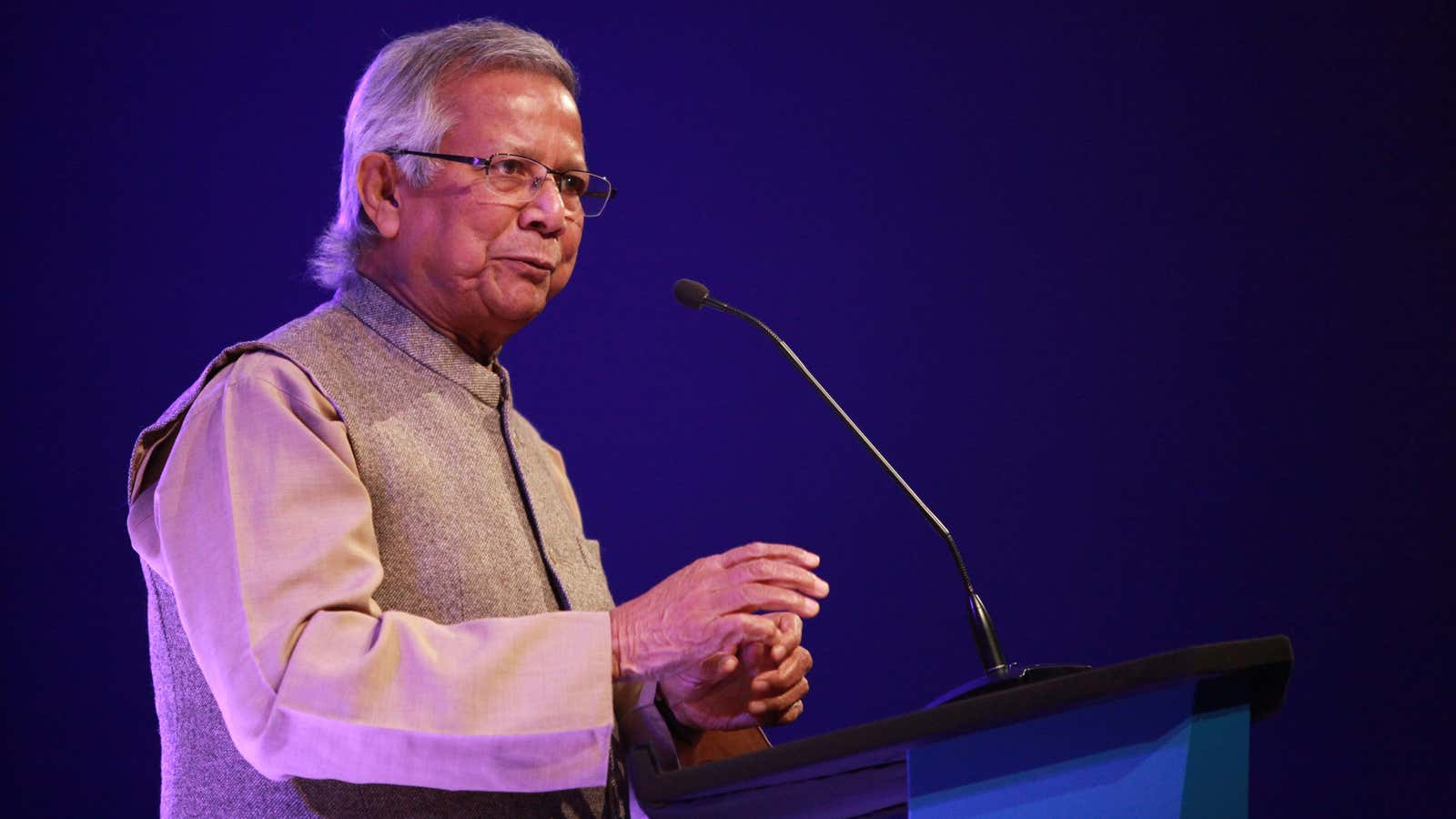Muhammad Yunus won the Nobel peace prize for inventing microfinance, the practice of lending small sums at a low interest to allow people to start businesses. And yet he’s not a fan of capitalism. “Because of its total focus on money-making, [it] has become greed-oriented,” he says.
The belief that money and wealth are the ultimate good has, Yunus thinks, given rise to three great societal ills: Unemployment, as competition for a set number of jobs; environmental destruction, which is accepted as a side-effect of economic growth; and poverty, an inevitable consequence of wealth concentration.
In economic theory, Yunus says, wealth distribution is described as a champagne glass: A long thin stem (representing everyone from the very poor to the nearly rich) supports a large cup where wealth accumulates in the hands of few very rich. He finds this metaphor outdated, and suggests replacing it with “a huge mushroom [whose cap] keeps growing,” sucking the nourishment out of “a long stem which gets thinner and thinner.” Eventually, Yunus says, the stem can no longer support the weight of the cap, and the mushroom collapses. ”We are calling [inequality] a problem of wealth distribution,” Yunus says, “but there is no distribution—there is only concentration,” he says.
But he has a solution, outlined in his latest book A World of Three Zeros. At its core is a new concept of business, the “social business,” which has the objective of addressing a social problem rather than accumulating wealth. Sitting in between for-profit and non-profit enterprise, the social business satisfies the selfless component of human instinct, so far ignored by an economic theory (and system) driven by selfishness. Humans, Yunus says, “are both selfish and selfless,” and they should be allowed (and educated) to measure business success not just in terms of monetary gain but in the ability to improve society.
Yunus, who has seen social businesses flourish thanks to microfinance loans, rests his vision of a new system on two core principles. The first is that people are born to be entrepreneurs, but this nature gets constrained in a system that teaches them to be merely job-seekers, limiting job creation to a privileged few. The second is that some people would fulfill that natural inclination by starting businesses that don’t have wealth accumulation as their only goal, if only they thought doing so were an acceptable measure of success.
And if wealth were not the only yardstick, Yunus says, new objectives and goals would open up in front of our eyes. People would solve unemployment by becoming, in larger numbers, job creators rather than job seekers. As a result they would stay out of poverty, having access to capital as long as they can create a sustainable business, even if it doesn’t produce enormous wealth. And they would protect the environment by considering it a resource, not merely fuel to more wealth creation.
If this seems utopian, Yunus’s book includes a few examples in which this approach has already yielded results. Food multinational Danone, for instance, created a low-cost yogurt to relieve malnutrition in Bangladesh, and French-fries giant McCain turned oddly shaped potatoes and vegetables into cheap, but nutritious soup. On a smaller scale, Yunus mentions a small New York restaurants that hire former convicts. These are different from charities, or corporate responsibility projects, as they are investments that become sustainable businesses, even though they don’t bring high dividends.
But how would a change like this happen on a larger scale? Yunus, who has an unshakable faith in the world-changing power of human selflessness, has a two-step plan. To start with, people would be raised and educated to know that they have a choice between being employers and employees, and between pursuing profit and effecting social change. Today most people don’t learn the fundamentals of entrepreneurship until late in the education cycle—and even then only if they go to business school. Yunus envisions exposing to the possibility of creating businesses early on, as soon as their formal education begins, just as now kids are educated young about the need to find a job.
Then, people would have access to investment, and capital more easily, regardless of their social background. Just as recruiters are invited to job fairs, social venture capitalists—investors with specific interest in promoting social businesses—would have access to students, who would even know completing their higher education isn’t necessary if they have the will and opportunity to start a business.
Yunus believes this would begin by slowing down the current capitalistic system, then eventually replace it an even mix of socially-oriented and wealth-oriented businesses. This, Yunus says, is the only way to change the destructive tendencies of greed-driven capitalism.
